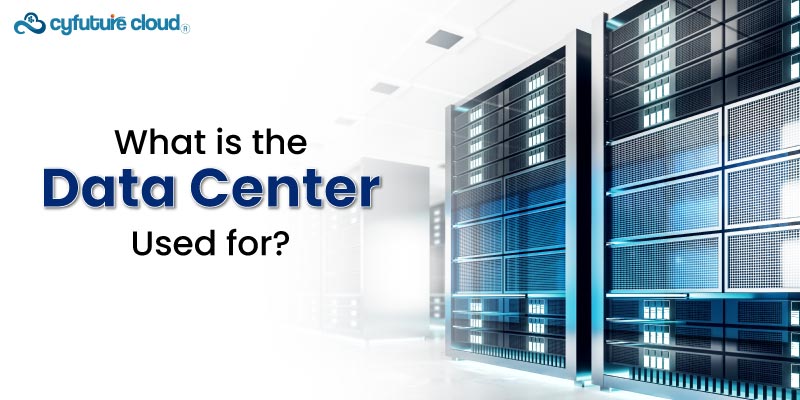 Server
Colocation
Server
Colocation
 CDN
Network
CDN
Network
 Linux Cloud
Hosting
Linux Cloud
Hosting
 VMware Public
Cloud
VMware Public
Cloud
 Multi-Cloud
Hosting
Multi-Cloud
Hosting
 Cloud
Server Hosting
Cloud
Server Hosting
 Kubernetes
Kubernetes
 API Gateway
API Gateway


Welcome to our knowledge base section. Today, we will learn what the data center is used for.
So, let’s get started!
1. Storing and Managing Data
Data centers play a fundamental role in looking after the digital information essential to modern life, offering a secure, reliable base for keeping all sorts of data. Data centers house our digital artifacts. These range from videos filmed at home through photos of loved ones and birthday reminders to office documents, financial records, and medical images.
They contain what is most important to us as human beings. Data centers are also the trusted custodians of large and small companies, protecting their valuable data and ensuring it remains compliant with the regulations in effect.
2. Running Applications and Services
More than just the home of data, however, data centers also propel the applications and services we depend on daily. Streaming music and video, reading and writing email, catching up with friends and followers — even collaborating on cloud-hosted productivity tools: the computational horsepower needed to deliver these Cloud services to users around the world is provided by data centers.
By consolidating the resources needed to run applications, data centers ensure that services are easily accessible, operate reliably, and perform well, even when demand for the associated services surges.
3. Processing and Analyzing Big Data
The numbers tell the story. The digital universe will reach 44 zettabytes in the next few years, up from 4.4 zettabytes of data today. There will be 41.6 billion Internet of Things (IoT) devices generating rainfall data, wearable biometric data, and even the temperature of a jet engine, increasing data volumes even further. And as millions of eyes track a World Cup soccer tournament, social media will explode with video clips, GIFs of goals, and mentions of teams and players.
Each second of video can contain 5 to 10 MB of data —and within a minute of streaming HD video to your smartphone, you’re accessing enough data to fill a big-box telephone book! All this data allows us to analyze customer behavior, optimize supply chains, predict market trends...and be sure to turn off the stove at home!
4. Supporting E-commerce and Online Transactions
E-commerce has become essential to the global economy, enabling companies to interact with customers and earn online money. Large numbers of national citizens have had the chance to experience the benefits of e-commerce, from which Western traders benefit.
E-commerce hinges on information technology, including various investment means such as information platform investment and purchasing electronic commerce infrastructure and data centers.
The shift from the traditional production model towards a higher-tech replacement system with capital intensiveness can thus be seen distinctly in the recent growth of information networks such as the Internet, various customer relationship management (CRM) systems, and e-commerce platforms.
By managing stock, transporting orders, and ensuring that e-business is uninterrupted, data centers play a crucial role in maintaining a smooth-running e-commerce environment for businesses to prosper in the digital economy.
5. Facilitating Communication and Collaboration
Businesses and organizations need effective communication and collaboration in an increasingly interconnected world. These communication and collaboration tools are arrayed along the battlefront of data centers, which are so numerous and complex that regardless of their position in space, machines in data centers allow teams to work as if they were all sitting in the same room.
Data centers provide the necessary infrastructure in today's digital workplace: email and instant messaging, video conferencing, screen sharing, file sharing, and project management. This drives productivity and innovation by making possible the communication and cooperation of everyone's labor at a distance without any particular piece of software being "better suited.”
6. Enabling Disaster Recovery and Business Continuity
Equipped with the advanced hardware necessary for rapid data transfer, data centers enable the seamless migration of operations that shield businesses from substantial revenue loss and protect their reputation and customer trust in even the worst scenarios.
Though precautions cannot prevent every challenge, a prudent infrastructure architecture incorporating geographically dispersed data centers substantially fortifies any operation against the potentially devastating consequences of an unplanned outage.
When dealing with unexpected incidents--from natural disasters to cyberattacks or hardware failures--data centers are vital for business continuity and disaster recovery. Companies can minimize downtime and limit the severity of interruptions by distributing their data centers widely. Data centers carry the necessary hardware to move data around fast. This protects businesses from the loss of revenues they might have incurred, as well as safeguards their reputation and trust with customers if they terminate a contract.

Let’s talk about the future, and make it happen!
By continuing to use and navigate this website, you are agreeing to the use of cookies.
Find out more


